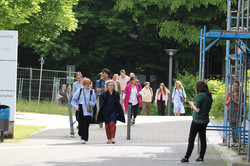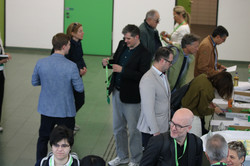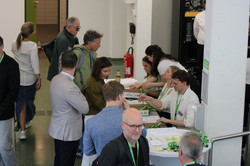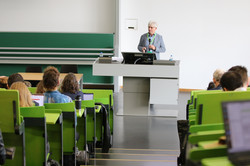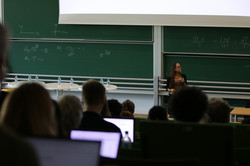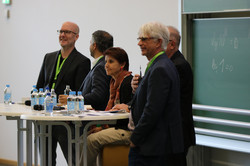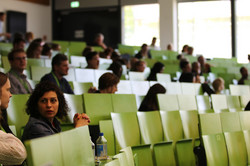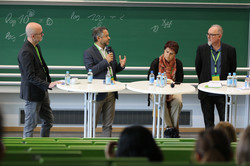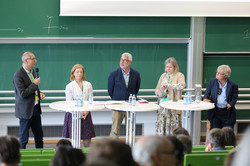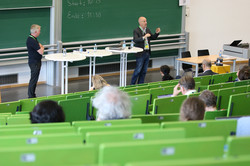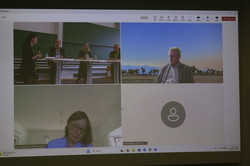Shaping Societal Futures through Innovation Policy: Eu-SPRI 2025 at TU Dortmund University
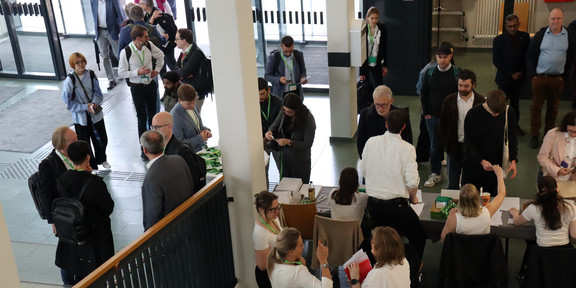
The “European Forum for Studies of Policies for Research and Innovation” (Eu-SPRI Forum) aims to strengthen the interdisciplinary community of researchers focusing on interdisciplinary dimensions related to policy in the field of research and innovation. One of its four key missions is to structure the field of STI policies by bringing together different perspectives and topics in an annual conference attended not only by established and early-career researchers, but policy-makers as well.
This year’s theme, “Shaping Societal Futures with STI Policies,” addressed urgent questions on how innovation strategies can support social, ecological, and digital transformation in an age of global crises. The conference program featured nearly 300 contributions across 77 sessions, 30 thematic tracks, and five special sessions.
Key themes tackled the intersections between social, technological, and ecological innovation, addressing:
- STI policies and the resilience of our societies
- New (post-Schumpeterian) models of innovation policy
- Lessons and insights from the Global South
- The integration of STI policies with broader national strategies such as Industry 4.0 and Just Transition
- Post-growth and sufficiency debates in innovation
Discussions centered on:
- The evolving role of universities in future societies
- AI in science and innovation policy
- Social innovation and mission-oriented policy
- Responsible energy technologies in a multi-crisis world
On June 11 started the very well attended conference with the opening by Jürgen Howaldt. The highlights of the conference included two keynote speeches by Uwe Cantner (Friedrich Schiller University Jena) and Caroline Paunov (OECD Working Party on Innovation and Technology Policy) as well as, among all three days, high-level plenary discussions on the future of European innovation policy and the role of social innovation in international discourse with, among others Filipe Almeida (Portugal Social Innovation).
As the conference drew to a close on June 13, the final plenary panel focused on the strategic role of STI in navigating crises, featuring the voices of policy-makers from Sweden, Austria, and Finland, and chaired by Philippe Larrue (OECD). The event concluded with the announcement of Eu-SPRI 2026 organized by INGENIO and taking place at Polytechnic University Valencia, promising to continue the conversation on transformative innovation.
In addition to its rigorous academic program, Eu-SPRI 2025 offered participants rich networking and cultural opportunities, including visits to the Dortmund Football Museum, Innoclub, and the DASA Working World Exhibition, which also hosted the festive Conference Dinner.
The Conference was supported by the European School of Social Innovation and also featured many more highlights for a lot of different themes. For an greater overview you can visit our social media channels (LinkedIn/Instagram).
The Eu-SPRI forums aims to foster the next generation of STI researchers by organising several activities for early career scientists over the year. In the run-up to the Eu-SPRI conference, the Social Research Centre Dortmund organised an Early Career Event focussing on striking a balance between academic and societal impact on 10th June: Transdisciplinary research creates real-world impact by tackling complex societal challenges. Researchers must juggle many roles, build new skills, and invest time in relationships and project management. For early-career researchers on short contracts, this can be risky and hard to prioritize over traditional academic outputs. 5 senior scientists and 18 early career researchers researchers came together to discuss their challenges and potential support in pursuing an academic career with impact.
The very good turnout and the lively exchange between all participants ensured a productive and successful conference over the past four days.




![[Translate to English:] [Translate to English:]](/storages/zentraler_bilderpool/_processed_/a/f/csm_Kontakt_b86e8d8ecc.png)

